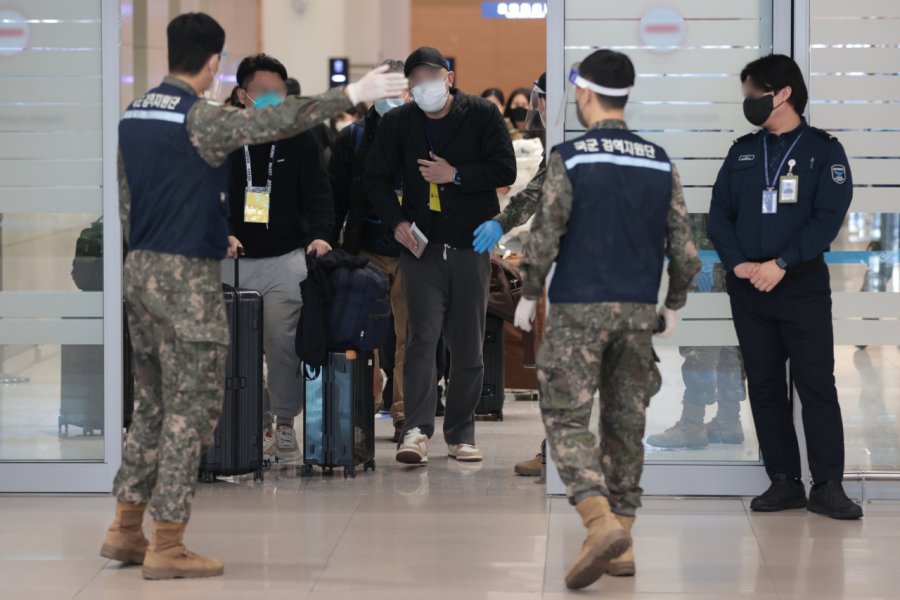January 12, 2023
SEJONG – China said Korean and Japanese nationals will be required to have transit visas when transiting through a Chinese airport as of Wednesday, extending its apparent retaliation against Seoul’s quarantine mandate on travelers from China that requires them to submit a PCR test upon arrival.
Citing “discriminatory entry restrictions” by Korea and Japan, China also said travelers from two countries will not be allowed to get visas at points of entry in China.
The announcement was released a day after it said it would halt short-term visa issuance for Korean and Japanese travelers immediately. Those visiting China for business, tourism or medical treatment, among other purposes, have been affected by the decision.
South Korea’s Prime Minister Han Duck-soo, however, denied speculation that China’s short-term visa suspension on Tuesday was a “retaliatory action” against South Korea’s toughened requirements for travelers from China.
Han added that communications have been underway between South Korea and Beijing over Seoul’s need to curb the further spread of COVID-19 as it weighs lifting a longstanding indoor mask mandate, in a press conference held at his residence in the de facto administrative capital Sejong.
“I don’t see (China’s short-term visa suspension for Korea) as a retaliatory action,” Han said Tuesday evening.
“I’ve asked the Foreign Ministry to explain why we take these actions at the moment when we made such decisions. We have been communicating (with China).”
Han also said that there is no political intention or discrimination behind the decision to temporarily stop issuing short-term visas, mandating PCR test results and requiring quarantine for those flying from China.

Prime Minister Han Duck-soo speaks at a press conference held at his residence in Sejong City Tuesday evening. (Yonhap)
The decision to take preemptive measures was inevitable, as Korea feared a sharp rebound in the number of COVID-19 infections, according to Seoul.
“We might find ourselves in hot water if things get worse in China than what is being observed from the outside, because (a new wave of COVID-19) might see millions, or hundreds of millions, infected there,” Han said.
“We prioritize Korean people’s safety. We handle what happens as a consequence of it through communications.”
President Yoon Suk Yeol echoed Han’s remarks on Wednesday, saying the decision to restrict traveler inflow from China was based on “scientific evidence.” Yoon also ordered the Foreign Ministry to explain Korea’s stance to prevent the relationship between the two countries from turning sour.
The China factor appears to be one of the final hurdles lying ahead of Korea’s bid to lift its longstanding indoor mask mandate. Korea is gauging the timing for ending its indoor mask mandate by as early as this month, with signs of a slower spread of the virus.
The coronavirus basic reproduction number fell below 1 for the first time in 12 months, meaning the outbreak has tentatively started to head for an end, according to data revealed at the Central Disaster and Safety Countermeasures Headquarters meeting Wednesday.
The weekly average number of COVID-19 cases has also been on a decline for two straight weeks, while the availability of intensive care units has been standing above 50 percent nationwide. Korea has already met the minimum requirements to lift the mask mandate, according to the nation’s top coronavirus policy adviser Jung Ki-suck on Monday.

People traveling from China to South Korea are seen following the instruction of the Korean military personnels at Incheon Airport on Monday. (Yonhap)
The surge in imported cases from China is a worrying sign despite the circumstances, as Seoul is poised to begin discussing eased masking rules.
“China is a factor, and experts will discuss next week whether Korea can control the spread without a mask mandate, given the virus situation in China,” Han said.
Korean health authorities said Wednesday that 17 percent of entrants from China have so far tested positive since last week, when Korea implemented tighter quarantine rules on arrivals.
Lim Sook-young, director of the infectious disease crisis response bureau at the Central Disaster and Safety Countermeasures Headquarters, said Wednesday that authorities should take heed despite strengthened quarantine measures on entrants from China, given that over 30 percent tested positive at the highest point.
“To my knowledge, the coronavirus situation in China is getting worse,” Lim said.
“China’s decision to stop counting figures has left Korea, which is geographically close to China, vulnerable to danger and uncertainties. … When you look at the data, the current quarantine measures in place appear to be based on neutral and scientific evidence.”
Meanwhile, the Ministry of SMEs and Startups said Wednesday it was scrambling to handle inconveniences that Korea’s small and medium-sized enterprises are suffering in the wake of China’s visa restrictions, and pledged a pangovernmental effort to minimize its impact.


